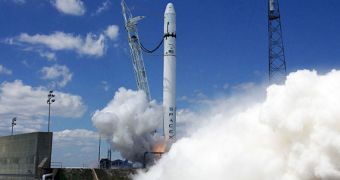Officials at the Hawthorne, California-based Space Exploration Technologies Corporation (SpaceX) announce that they are currently targeting a June 4 launch date for their Falcon 9 rocket. The delivery system was assembled at its Cape Canaveral Air Force Station (CCAFS) launch pad months ago, but thus far various technical issues and delays prevented lift-off from taking place. Another obstacle was a permit certifying the flight termination system (FTS), which has yet to be received, Space Fellowship reports.
The FTS lets Air Force officials destroy the rocket in the event that it strays off course during launch. Thus far, the range resources needed to process the SpaceX request for approval have been tied by the impending launch of an advanced USAF satellite, which is to underlie the next generation of GPS networks. With its successful take-off days ago, officials at the company are now convinced that the final approval will be given by this Friday. A launch window opportunity opens at 11:00 am EDT (1500 UTC), and lasts for about 4 hours. The exact same interval is available on Saturday as well, when SpaceX has also reserved the slot, just in case something goes wrong on June 4.
Tomorrow, June 3, company officials plan to roll out the Falcon 9 vehicle to its designated launch site, and then to undergo final preparations for Friday. The engineering teams have just finished checking the rocket top-to-bottom, and experts say that the only thing left to be tested is the FTS. IF CCAFS Range safety officials give the go-ahead, then the system will be connected to the delivery system and tested either Thursday night or Friday morning. But, even if the company receives the approval, there is still the weather to consider. Things have been hectic in Florida lately, with clouds and rains putting dents in satellite launches, and even threatening to delay the landing of shuttle Atlantis at one point.
CCAFS weather officials announced that there was a 40 percent chance the launch would not take place on Friday. They explain that there is a large chance of cumulus clouds and anvil clouds forming from thunderstorms, which would interfere with a rocket launch. “It’s important to note that since this is a test launch, our primary goal is to collect as much data as possible, with success being measured as a percentage of how many flight milestones we are able to complete in this first attempt. It would be a great day if we reach orbital velocity, but still a good day if the first stage functions correctly, even if the second stage malfunctions. It would be a bad day if something happens on the launch pad itself and we’re not able to gain any flight data,” SpaceX officials said in a statement.
“If we have a bad day, it will be disappointing, but one launch does not make or break SpaceX as a company, nor commercial spaceflight as an industry. The Atlas rocket only succeeded on its 13th flight, and today it is the most reliable vehicle in the American fleet, with a record better than Shuttle. Regardless of the outcome, this first launch attempt represents a key milestone for both SpaceX and the commercial spaceflight industry,” they conclude.

 14 DAY TRIAL //
14 DAY TRIAL //